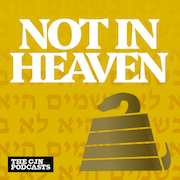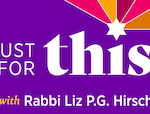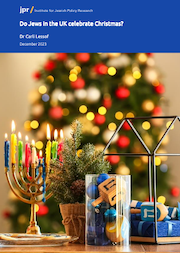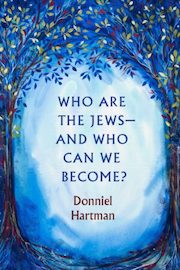Jewish Belonging Summit
Amid the horrible news this month, I was glad to participate in the first Jewish Belonging Summit sponsored by the JFNA’s Center for Jewish Belonging and the SRE Network. The Center’s Rabbi Isaiah Rothstein and SRE’s Rachel Gildiner were interviewed by eJP before the summit and afterwards wrote “Belonging cannot wait” for eJP.
I met many very interesting people and there were many interesting discussions. The summit captured how plenary participants’ defined “belonging.” I wondered how Rabbi Sandra Lawson’s definition – that “we are called to create community where no one has to leave out parts of themselves” – would apply to interfaith couples and partners from different faith backgrounds.
At a workshop that discussed survey data about the “surge” of Jewish engagement post-October 23, I heard a phrase that was new to me: “historically disadvantaged” groups, referring to LGBTQ+ Jews, Jews of color, and “mixed heritage” Jews. The overall point made was that while “belonging is critical to building flourishing communities,” historically disadvantaged groups find meaning in Jewish life personally but not in their larger communities.
I didn’t feel enough was said about inclusion of interfaith families and partners from different faith backgrounds. At the opening plenary, 18Doors’ Adam Pollack told a personal story about how he was told fifteen years ago that having such a partner was not a good model for a Jewish professional, and how 18Doors now helps people in interfaith relationships. That was the only mention of interfaith family inclusion I heard at the plenaries.
There were some passing references. Rabbi Rothstein usually referred to “Jews and their loved ones.” Schusterman’s Lisa Eisen said, “You’re welcome and belong here, whether you’re Jewish or not.” But most of the discussion was about inclusion of LGBTQ+ Jews and Jews of Color.
I am totally in favor of LGBTQ+ and Jews of Color inclusion, which is extremely important. But Jews who are in interfaith relationships vastly outnumber those who are LGBTQ+ or of Color.
There is also tremendous intersectionality between these groups. Just before the summit, Bruce Phillips provided me with information he had drawn from the 2020 Pew report data: 77% of gay or lesbian Jews and 80% of Jews of Color have a spouse or partner who is not Jewish (compared to 43% of straight Jews and 43% of white Jews). By comparison, only 5% of gay or lesbian Jews are Jews of Color (another 3.5% are Hispanic), and only 4.7% of Jews of Color (and 4.9% of Hispanic Jews) are gay or lesbian.
In his comments at the opening plenary, Adam Pollack mentioned that he saw “so many partners” at the summit. But over many years, despite the very high proportion of interfaith relationships, I haven’t heard advocates for LGBTQ+ inclusion or Jews of Color inclusion say much about interfaith family inclusion. I didn’t hear that at the summit either.
Keshet recently released “Threads of Identity,” a report on “the unique experiences, challenges, and resilience of LGBTQ+ Jews of Color in Jewish spaces.” They find that “a lack of support, representation, and biases from fellow Jewish community members often lead to feelings of isolation, exclusion, and the need to compartmentalize aspects of their identity” and call for Jewish spaces to be more inclusive of their unique needs. I would love to see reports on LGBTQ+ Jews and Jews of Color in interfaith relationships.
I hope that there will be future summits, where there will be more airtime for interfaith family inclusion, in deep collaboration with all other historically disadvantaged groups.
Wrong Ideas About Interfaith Marriage and Demographic Loss
 The Boston Globe published a story about a Massachusetts synagogue in which a gratuitous comment seemed to partly blame intermarriage for its closing. I wrote the following letter to the editor (it’s behind a paywall):
The Boston Globe published a story about a Massachusetts synagogue in which a gratuitous comment seemed to partly blame intermarriage for its closing. I wrote the following letter to the editor (it’s behind a paywall):
In his moving essay about the closing of the synagogue where generations of his family had gone, Larry Tye writes, “Intermarriage rates are climbing, but more slowly, and rates of conversion are rising.”
The Pew Research Center’s report, “Jewish Americans in 2020,” found that “the offspring of intermarriages have become increasingly likely to identify as Jewish in adulthood.” Len Saxe, who leads the Cohen Center for Modern Jewish Studies at Brandeis, has suggested that that is one of the most important reasons that the Jewish population in the United States is increasing.
A Jewish Telegraphic Agency story in 2021 concluded, “Intermarriage, rather than acting as a net negative for Jewish population, actually has resulted in more Jews.”
Globe readers should understand that welcoming and including interfaith families is key to the ongoing growth and thriving of American Jewish communities.
 The false idea of demographic loss also came up in a short podcast, “1 in 3 Canadian Jews have a non-Jewish spouse. What does that mean for the country’s Jewish future?” A new study of Canadian Jews found that “intermarriage is no longer as rare as it used to be in Canada, with 30 percent of Canadian Jews marrying outside their faith.” The podcast introduction reads:
The false idea of demographic loss also came up in a short podcast, “1 in 3 Canadian Jews have a non-Jewish spouse. What does that mean for the country’s Jewish future?” A new study of Canadian Jews found that “intermarriage is no longer as rare as it used to be in Canada, with 30 percent of Canadian Jews marrying outside their faith.” The podcast introduction reads:
So what do we make of this? Doomsayers have called intermarriage a “second Holocaust”, but the unavoidable reality of young people moving away from religion can’t be fought. Should Jewish institutions and community leaders expand their outreach, or do they tighten their grip on what it means to be a Jew?
Phoebe Maltz Bovy asked how much of the negativity about interfaith marriage was because of concerns over continuity, and how much about religion. She said the demographic concern, that interfaith marriage means fewer Jews, “might not be the thing.” Matthew Leibl, a rabbi in Winnipeg who officiates at weddings of interfaith couples, agreed. He said he uses the term “dual faith” because “interfaith” and “intermarriage” have such negative connotations. Leibl also offered what he called an “easy fix” for the religious concern – to recognize patrilineal descent – an important idea, but not so easy to implement.
Ignoring the Partners
Finally, in time for Shavuot, Rabbi Jeffrey Salkin and Sandra Lilienthal offer “The Jewish People stood together at Sinai. Can we today?” It’s a nice emphasis on pluralism and plea for unity, but a missed opportunity to explicitly acknowledge and embrace interfaith families and partners from different faith backgrounds.
The authors surely know that a “mixed multitude” (Exodus 12:38) left Egypt with the Israelites and was present at Mount Sinai when the Torah was received. But their essay only says, “Every Jew past, present and future and everyone who would someday become a Jew was present at Sinai” and “the entire Jewish people was present for the same revelation.”
If they meant to include, in “the entire Jewish people,” Jews and their loved ones, that would have been a very welcome Shavuot message.

 Embark is a relatively new program, now part of Mem Global, for young adult interfaith couples. Rabbi Ari Perten of Mem Global and Ezra Kopelowitz,
Embark is a relatively new program, now part of Mem Global, for young adult interfaith couples. Rabbi Ari Perten of Mem Global and Ezra Kopelowitz,  New research about reinventing Hebrew school (the
New research about reinventing Hebrew school (the  Rabbi Liz PG Hirsch, executive director of
Rabbi Liz PG Hirsch, executive director of  Negative attitudes about interfaith marriage are still with us. Hey Alma’s advice columnist
Negative attitudes about interfaith marriage are still with us. Hey Alma’s advice columnist  The UK Institute for Jewish Policy Research issued a new
The UK Institute for Jewish Policy Research issued a new  In his new book,
In his new book,  eJewishPhilanthropy
eJewishPhilanthropy  Dr. Staetsky says that “the definition of Jewishness dictated by Jewish law… is broadly accepted by all Jews, while the modifications to it, or expansions, are not.” That’s the root of the problem – the traditional perspective doesn’t tolerate inclusion of interfaith couples or their children. It views high rates of interfaith marriage as a problem, a failure. Comparing the rate of all married Jews who are intermarried, the IJPR study finds the US in the middle of the pack at 45%, compared to Israel at 5% and Poland at 76%; a self-congratulatory
Dr. Staetsky says that “the definition of Jewishness dictated by Jewish law… is broadly accepted by all Jews, while the modifications to it, or expansions, are not.” That’s the root of the problem – the traditional perspective doesn’t tolerate inclusion of interfaith couples or their children. It views high rates of interfaith marriage as a problem, a failure. Comparing the rate of all married Jews who are intermarried, the IJPR study finds the US in the middle of the pack at 45%, compared to Israel at 5% and Poland at 76%; a self-congratulatory  More evidence of the persistence of traditional attitudes is
More evidence of the persistence of traditional attitudes is  Sandy pointed me to new text on the Global Jewry website: “We believe in inclusivity and embrace Jews of all backgrounds, affiliations, and levels of observance. Whether you’re Orthodox, Conservative, Reconstructionist, Reform, Just Jewish, exploring your Jewish identity or supporting your Jewish partner, you’ll find a warm and accepting space here.”
Sandy pointed me to new text on the Global Jewry website: “We believe in inclusivity and embrace Jews of all backgrounds, affiliations, and levels of observance. Whether you’re Orthodox, Conservative, Reconstructionist, Reform, Just Jewish, exploring your Jewish identity or supporting your Jewish partner, you’ll find a warm and accepting space here.” I liked a
I liked a